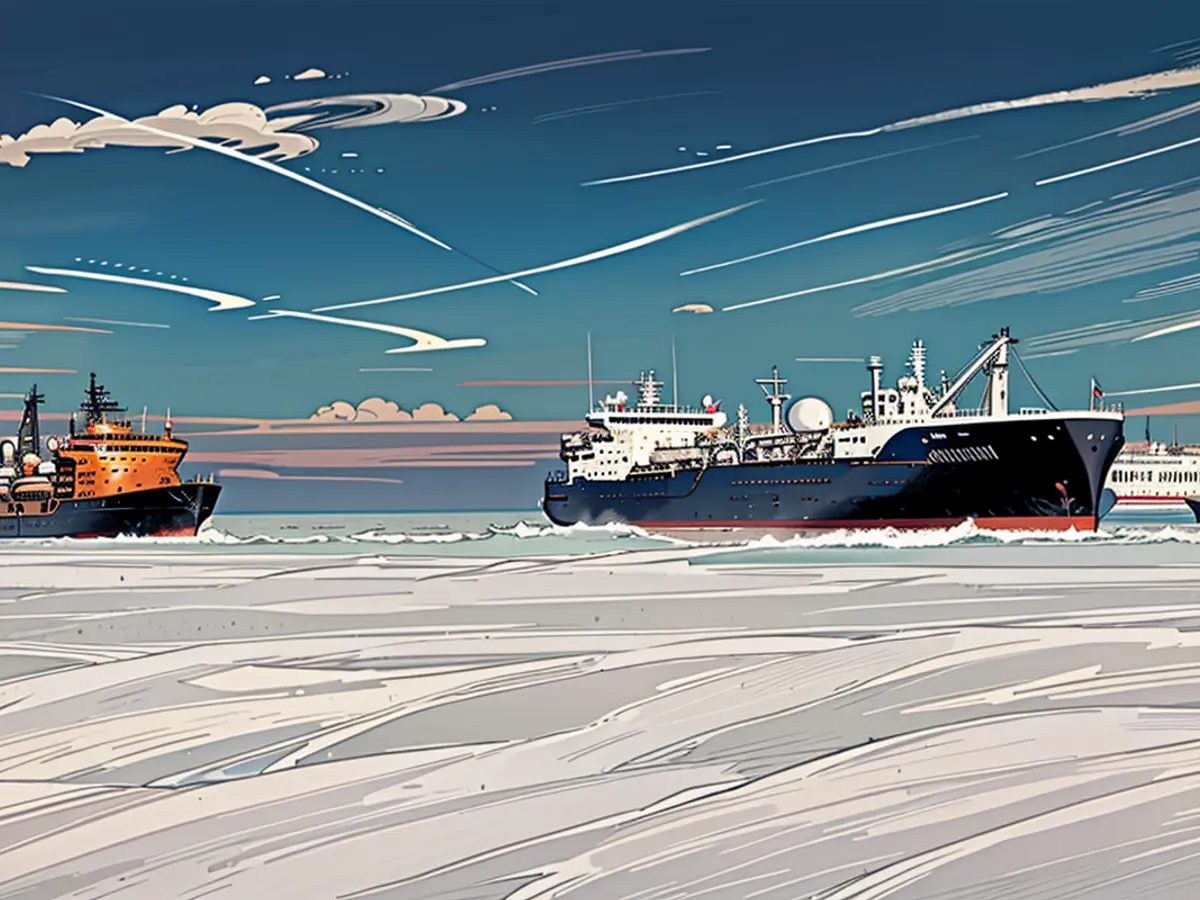Moscow's new shadow fleet is already ready
The first EU sanctions against Russian gas have not even taken effect yet, but it already looks like Russia is circumventing them. Liquefied Natural Gas (LNG) tankers are being transferred to unknown companies in Dubai. One ship remains unaffected by Huthi attacks.
Just as the first gas sanctions against Russia have been adopted by the EU, signs of a shadow fleet for the export of LNG from Russia are already emerging in the LNG industry. Russia has amassed rich experience in this regard in the oil sector.
While the European Union has long stopped importing Russian oil at sea due to the Russian invasion in Ukraine, LNG can still be shipped from Russia to the EU. The German Institute for Economic Research (DIW) considers a complete withdrawal from Russian gas to be possible, but some EU countries see it differently. The latest sanctions package will at least prohibit the further transport of LNG from Russian ports to third countries from the next year. The transshipment ban is intended to reduce the amount of LNG Russia can sell due to insufficient transport capacity.
Usually, Russian tankers, which are suitable for operation in ice-covered waters, transport LNG from the Yamal Peninsula in Siberia to EU ports. There, the LNG is loaded onto normal tankers, which then sail to distant world regions. This allows the "icebreaker" tankers to make significantly more voyages. According to EU Commission data, around 4 to 6 billion cubic meters of Russian LNG were transshipped through EU countries to other countries last year. Businesses worth several billions of euros could be affected.
"Icebreaker" Tankers for Dubai
Russian tankers, which are suitable for operation in ice-covered waters, have often transported LNG from the Yamal Peninsula in Siberia to EU ports in the past. There, the LNG is loaded onto normal tankers, which then sail to distant world regions. This allows the "icebreaker" tankers to make significantly more voyages. According to EU Commission data, around 4 to 6 billion cubic meters of Russian LNG were transshipped through EU countries to other countries last year. Businesses worth several billions of euros could be affected.
Just as the EU banned the transport of Russian oil through EU ships to third countries and financial assistance for such transport, there are now indications that Russia is also circumventing these measures in the LNG sector. According to shipping data from Equasis, in the past three months, the ownership of at least eight ships has been transferred to little-known companies in Dubai, as reported by the financial news agency Bloomberg. Four of these ships belong to the ice class and are therefore designed for operation in ice-covered waters. They have already received permission from Russia to sail through its arctic waters this summer.
Tankers cannot be definitively attributed to Russian companies, but noticeable are the use of obscure companies and old ships that should have been decommissioned by now. In the LNG industry, it is highly unusual for unknown buyers to acquire hundreds of millions of dollars' worth of specialized ships, as stated in the report. At least three of the eight tankers have unknown insurers according to the International Maritime Organization. Striking is also the record number of approvals for the northern sea route from Russia to Asia, as quoted by Malte Humpert from the US think tank Arctic Institute.
Bloomberg reportedly caused a stir in the industry with the Asya Energy. The ship allegedly passed through the Red Sea as the first LNG tanker since January without damage, despite Huthi attacks. The 22-year-old ship, which flies the flag of Palau, an island nation in the Pacific, is managed by Nur Global Shipping. This previously unknown company operates from a luxury hotel in a free trade zone of the United Arab Emirates, according to the report. No insurer is known. According to Bloomberg's data analysis, the ship was on its way to the Mediterranean, apparently unloaded and without a stated destination.
Unlike the shadow fleet for oil transport, it appears that masking Russian origin in LNG shipping is not as simple. On the one hand, the crew must be technically better trained for the extremely cooled cargo. On the other hand, fewer ships are suitable for this, making satellite tracking easier. In addition, LNG is more difficult to transfer to another ship at sea than oil.
With its latest sanctions package, the EU is attempting to prevent the bypassing of previously imposed sanctions. Among other things, ships from Putin's oil shadow fleet are now on the list. The indications of an LNG shadow fleet show that there have not been the last sanctions against Russia. Agathe Demarais of the European Council on Foreign Relations summed it up to Bloomberg: "As soon as a network for sanctions evasion is set up, it comes under the scrutiny of Western authorities and is then replaced by another one in an endless game of cat and mouse."
Russian analysts had spoken of a blow against LNG producers in light of the current sanctions package. However, the sanctions were relatively mild. And there is a transition period - which allows Russian companies to find new buyers and alternative routes, as in the case of the oil embargo.
With the EU's ban on transporting Russian oil through EU ships to third countries, there are indications that Russia is also bypassing these measures in the LNG sector. Eight LNG tankers have been transferred to little-known companies in Dubai, four of which are ice class and can operate in ice-covered waters.
Despite the EU's efforts to prevent the bypassing of previous sanctions, Russian analysts suggest that there may be an emerging LNG shadow fleet, as Russian companies seek new buyers and alternative routes.








